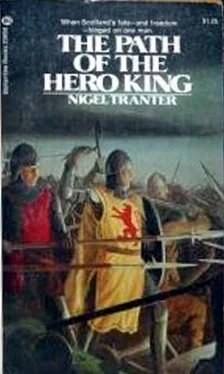Chancellor, and then resign the office to another more useful-as is
right and proper. For I have to return to my ward in England tomorrow, and can therefore by no means serve in this important office further. His Grace needs an active Chancellor, not a paroled prisoner on foreign soil…
There was an outbreak of groans and protest.
The Primate shook his head.
In this matter my mind is made up. The seals of office have been kept secure for me by my lord Bishop of Dunblane, during my captivity. For his good stewardship I thank him. Those seals and this office I now lay down before you all, for my successor. He paused.
Before I sit, I have one announcement to make, not as Chancellor but as Bishop. I hereby declare that I, for good and sufficient reason, have demoted and excluded the Abbot John of Arbroath, not here present, from the rule and supervision of that my great house; and have appointed Master Bernard de Linton, Vicar of Mordington, Official of this diocese and secretary to His Grace, to be Lord Abbot of Arbroath in his stead.
Lamberton sat down, to a stir of excitement.
Bruce spoke into it.
We receive my lord Bishops resignation with regret but understanding. It is necessary that this realm, as this parliament, should have a Chancellor forthwith. I therefore here and now appoint Master Bernard, mitred Abbot of Arbroath, as Chancellor of the Kingdom, and require him to take up the seals of office, and to conduct the business of this assembly.
In absolute silence de Linton rose from his humble clerks desk, walked to the Chancellors table, bowed deeply to the King, less deeply to the Primate, touched the seals, and sat down.
There was no doubt about the sensation produced. For a young and unknown cleric to be appointed first minister of government was without precedent, however notable his suddenly enhanced rank. It was normal, though not automatic, that a cleric should be Chancellor, since few of the nobility were sufficiently learned in letters and Latin, the language of international correspondence, to cope with the duties. But there were many present who would have coveted the office, with all its influence-bishops, abbots, priors, of great seniority. Even Lennox himself, a scholar, Bruce suspected. But the King knew what he wanted from his Chancellor-and all recognised that this must be the monarchs personal choice. There were no formal protests, therefore, however much muttering.
My lord Abbot proceed.
Linton rose.
May it please Your Grace-first there are matters arising out of the recent wars, campaigns and truces. Certain matters fall within the authority of Your Graces Privy Council.
But others require the decision of parliament. First, sentences of forefeiture. Such sentences have been passed against certain your subjects, and it is now desired that they be rescinded. Where these subjects hold the rank of earl or the office of sheriff, it is necessary for parliament to make the decision. To this rank and standing belong William, Earl of Ross, and Sheriff thereof; Alexander, Lord of Argyll and Lorn, and Sheriff thereof; and Sir Alexander Comyn, knight, Sheriff of Inverness. All now under sentence of forfeiture for rising in arms again the Kings Grace. The Privy Council now requests that these forefeitures of lands and office be annulled.
With the exception of certain lands within the Lordship of Lorn which shall continue in forfeiture. Is it agreed?
Promptly, and on his cue, the Earl of Lennox rose.
My lord Chancellor-I so move, in the case of the Earl of Ross.
And I in the case of the Lord of Argyll and Lorn, the Lord of Douglas added.
And I in the case of Sir Alexander Comyn, knight, Sir Robert Boyd, knight, confirmed.
All duly moved, each by one of his own degree, Abbot Bernard acknowledged swiftly.
Is there any contrary motion?
With it all so obviously cut and dried, and by the Kings closest associates, it required a bold man to question it. But such bold man was present.
I know the warmth of His Graces heart-none better!
Edward Bruce said, rising.
But I for one doubt the wisdom of these remissions. Traitors seldom cease to be traitors because they are softly used! Mercy is good, but may be overdone. At least some part of these forfeitures should be retained, to ensure future loyalty! He sat down.
AH held breath, as the brothers eyed each other.
The King did not speak.
The new Chancellor cleared his throat, his voice less certain now.
My lord of Carrick-I am not clear. Do you oppose the motion?
Or make amendment? Or but… advise? In general…
Edward shrugged.
I leave that to you, sir. I am no clerk, no dabbler in words. I but speak my mind.
There was a ripple of undoubted approval and agreement over a sizeable proportion of the cathedral.
Bernard de Linton looked unhappily at the King.
Bruce, whose desire it was to intervene as little as might be, to have
the days proceedings appear as much as possible to be the true voice
of Scotland, sighed-although not audibly. Indeed, his voice sounded
easy, relaxed, as he came to the rescue of his embarrassed secretary.My lord of Carrick has made no counter-motion, nor yet an amendment, as I see it, he observed.
He but speaks his mind as he says. He also says, wisely, that he leaves the interpretation of his words to you, my Lord Chancellor. I advise, therefore, that you proceed.
Hmmm. Yes, Sire. Is… is there any contrary motion, then?
Edward frowned.
If so you must have it. Yes-I oppose the motion.
Almost with relief, since his own way at least was now clear before him, the new Abbot nodded.
The motion for remission of forfeiture stands proposed and opposed.
Does any wish to speak further? Before vote is taken?
There was a considerable pause, as all saw crisis, decision, yawning before them thus early in the day. Many indubitably felt as did Edward about the Kings policy of forgiveness, of working with his recent enemies-for the Scots are not notably a compromising or forgiving people. Indeed, despite all the previous days stagecraft and drama in the Priors Guest Hall, and despite the comprehensive nature of the next two days parliamentary programme, this issue was the basic one behind all. Could Robert Bruce do what none other had achieved, succeed where even Wallace had failed, and lead a united Scotland? Or must he merely be the dominant head of the strongest faction, keeping the others down?
A vote how would count heads with a vengeance. For and against the Kings policy. The King could not fail to note, and would certainly remember.
It was Lamberton who, unexpectedly, broke the tense silence.
My lord Chancellor, he said, may I, who have attended many parliaments, make bold to advise you in this? That all be done in order. You say that this was a motion of the Privy Council, which now asks for the homologation of parliament? Very well. May I enquire was my lord of Carrick present at that Privy Council?
He was, my lord Bishop.
And did he move, by vote, against the decision to put this proposal before parliament?
Linton blinked.
No … no, I think not. He argued against the policy of remissions, yes. But not … no, there was no vote taken.
Then, my lord Chancellor, I see your duty as clear. This being a Privy Council motion, no member of that Privy Council may move against it, unless he has first given prior notice. By the rules of procedure you should rule that my lord of Carricks contrary motion is out of order, and so falls.
Into the hubbub of exclamation the younger man banged his Chancellors gavel, with waxing confidence.
Читать дальше












